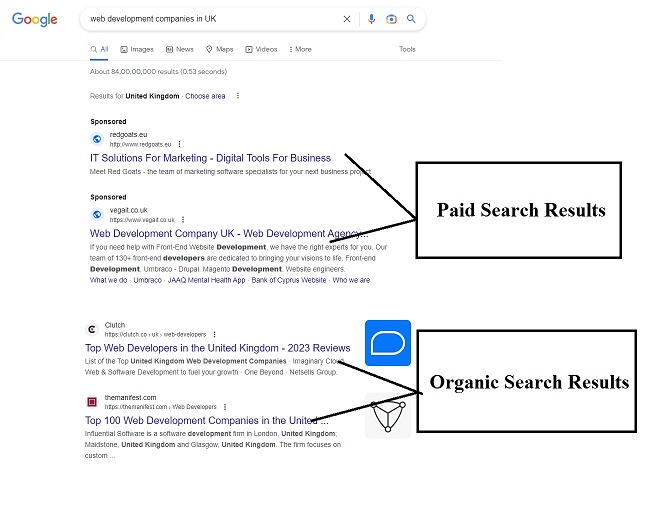Organic keywords refer to the words and phrases users input in search engines such as Google, Bing, and Yahoo to search for information or content. Organic keywords are unpaid and natural searches. They help in optimizing a website for SEO purposes. In this article, we will discuss organic keywords in detail.
What are Organic Keywords?

Organic keywords are the words and phrases users use to search for content on search engines like Google, Bing, and Yahoo. They are unpaid and natural searches. It means that the search engine results pages (SERPs) display organic search results, and by paid advertising, these results are not being influenced. Organic keywords are essential for SEO pursuits because they help businesses to rank higher on search engine results pages.
Types of Organic Keywords
There are different types of organic keywords. Some of them are as follows:
- Short-tail: Keywords that are broad and generic and consist of one or two words. Example: – laptops.
- Long-tail: These are specific and detailed keywords. These consist of three or more words. For example:- best gaming laptops under $ 1000.
- Branded keywords: Keywords that include a company or brand name. Example: – Apple iPhone.
- Non-branded keywords: These keywords do not include a company or brand name. Example: – best smartphones.
How to Find Organic Keywords?

There are various tools available to find organic keywords. Two of the most popular tools are Google Analytics and Google Search Console. Here is how you can use both of them to find organic keywords:
Google Analytics:
Step 1: Sign in to Google Analytics and go to the “Acquisition” section.
Step 2: Click “Overview” and then the “Organic Search” section.
Step 3: Here, you can see the organic keywords people use to find your website.
Step 4: To get a more detailed report, click on the “Organic Keywords” section to see a list of all keywords that bring traffic to your website.
Google Search Console:
1: Log in to your Google Search Console account and select your website.
2: Go to the “Performance” section and click on “Queries.”
3: Here, you will see a list of queries that users are typing to find your website.
4: To see the keywords, click “Pages” and then click on the page you want to see the keywords for. You will see a list of keywords getting traffic to that page.
Using these two tools, you can get a good idea of the organic keywords people use to find your website. You can then use this information to optimize your website and content for those keywords to improve your SERP and attract more traffic.
Why are Organic Keywords Important for SEO?
Organic keywords are crucial for SEO for the following reasons:
- Increased visibility: Organic keywords help businesses to rank higher on search engine results pages, which increases their visibility and reach.
- Increased traffic: Organic keywords can drive more traffic to a business website, resulting in increased conversions and sales.
- Improved relevance: Organic keywords help businesses to create relevant and valuable content that addresses the needs and interests of their target audience.
- Better user experience: Organic keywords help businesses to provide a better user experience by delivering relevant and valuable content that meets the needs of their target audience.
How to Improve Your Website Ranking for Organic Keywords?
Improving your website’s ranking for organic keywords requires a combination of technical and content optimization. Here are some tricks to improve your website’s ranking for organic keywords:
- Conduct keyword research: Utilize tools for keyword research. Identify relevant, high-volume keywords pertinent to your business and incorporate them into your content.
- Optimize on-page elements: Optimize your website’s title tags, meta descriptions, header tags, and URL structures to include target keywords and make it easier for Google to understand the content of your pages.
- Publish high-quality content: Create high-quality, original content optimized for your target keywords that provide your audience value.
- Optimize for user experience: Make sure your website is easy to navigate and loads quickly, as these factors can impact your SERP.
- Build high-quality backlinks: Focus on building high-quality backlinks from reputable websites in your industry, as this can improve your website’s authority and visibility in search engine results pages.
- Use social media: Promote your content on social media to attract more traffic to your website and increase engagement with your audience.
- Monitor your website’s performance: Use analytics tools to monitor your site’s performance, track keyword rankings, and identify areas where you can improve your optimization efforts.
Conclusion
In conclusion, organic keywords are crucial for companies looking to improve their website traffic and search engine rankings. Businesses can identify the organic keywords driving traffic to their websites and optimize their content and website elements using tools such as Google Analytics and Google Search Console. Ultimately, keyword research can improve your website’s ranking for organic keywords and drive more conversions and revenue. Therefore, you should prioritize organic keyword research as an integral part of your SEO strategy to succeed in today’s competitive online landscape.



